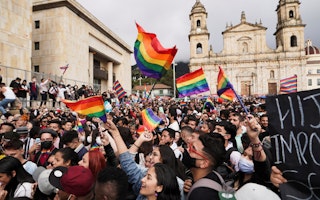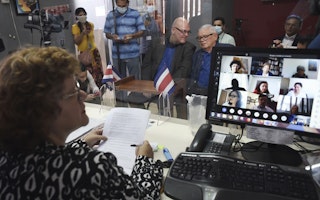Lesbian, Gay, Bisexual, or Transgender: Human Rights Are Human Rights
By David Scamell
When the United Nations Special Rapporteur on violence against women visited El Salvador in 2010, she learned about Paula’s story. A transgender woman, Paula was severely attacked and shot by a group of men on the street one night in San Salvador. When hospitalized, the harassment continued with health care personnel showing disdain because she was transgender and HIV-positive. Not long after being discharged, Paula was attacked again and the consequence of defending herself was to spend two years in an all-male prison on false charges of attempted homicide (her attacker later admitted to his actions). While in prison, she was raped more than 100 times by gang members, sometimes with the complicity of the prison security officers. Once released, she was again attacked when other gang members found out that she was HIV-positive and may have passed the virus to some of the men who had raped her.
Paula’s story is only one of many examples of serious human rights abuses against sexual and gender minorities that are increasingly being highlighted by UN Special Rapporteurs, treaty bodies, and the UN Human Rights Council. Many of those examples of abuses have now been compiled into a landmark report by the UN High Commissioner for Human Rights, released yesterday.
The report was developed as a result of a resolution during the 17th session of the Human Rights Council in June this year. By a vote of 23 for, 19 against, and 3 abstentions, the Council took the much needed step of recognizing that “the universality, interdependence, indivisibility and interrelatedness of human rights as enshrined in the Universal Declaration of Human Rights” applies to all people regardless of their sexual orientation or gender identity. Beyond this basic recognition, the Council called for the development of a report “to document discriminatory laws and practices and acts of violence against individuals based on their sexual orientation and gender identity, in all regions of the world, and how international human rights law can be used to end violence and related human rights violations based on sexual orientation and gender identity.”
The High Commissioner's report is a confirmation of the serious rights violations against sexual and gender minorities in all corners of the globe that LGBT activists have been exposing and challenging for many years. Namely, that in a third of all countries same-sex attracted people face the real threat of being imprisoned because of who they are; from the U.S. to Brazil, transgender people are murdered at unacceptably high rates; families headed by same-sex parents are almost universally denied legal recognition; people whose gender identity differs from their sex at birth are routinely denied the right to have their preferred gender recognized in passports, birth certificates, and other state documents; and, when sexual and gender minorities seek to organize and defend their human rights, they are swiftly and forcefully attacked by governments and right-wing bodies seeking to impose “traditional values.”
What this report contributes to the struggle is a comprehensive acknowledgement by the highest human rights official in the UN system that sexual and gender minorities are protected under international law, and that every State should enact sufficient measures in order to respect, protect, and promote their human rights. The severity of abuses that occur on the basis of sexual orientation and gender identity across the world is mirrored by the political resistance of many governments to recognize the rights of sexual and gender minorities (many countries cannot even acknowledge their existence, let alone their rights). Yet the march towards freedom and equality gathers steam. In Kenya and Tonga, Chile and Kyrgyzstan, sexual and gender minorities are mobilizing in the name of human rights. Yesterday’s report adds another tool to their toolkit.
Until June 2014, David Scamell was a program officer for the Sexual Health and Rights Project of the Public Health Program.


